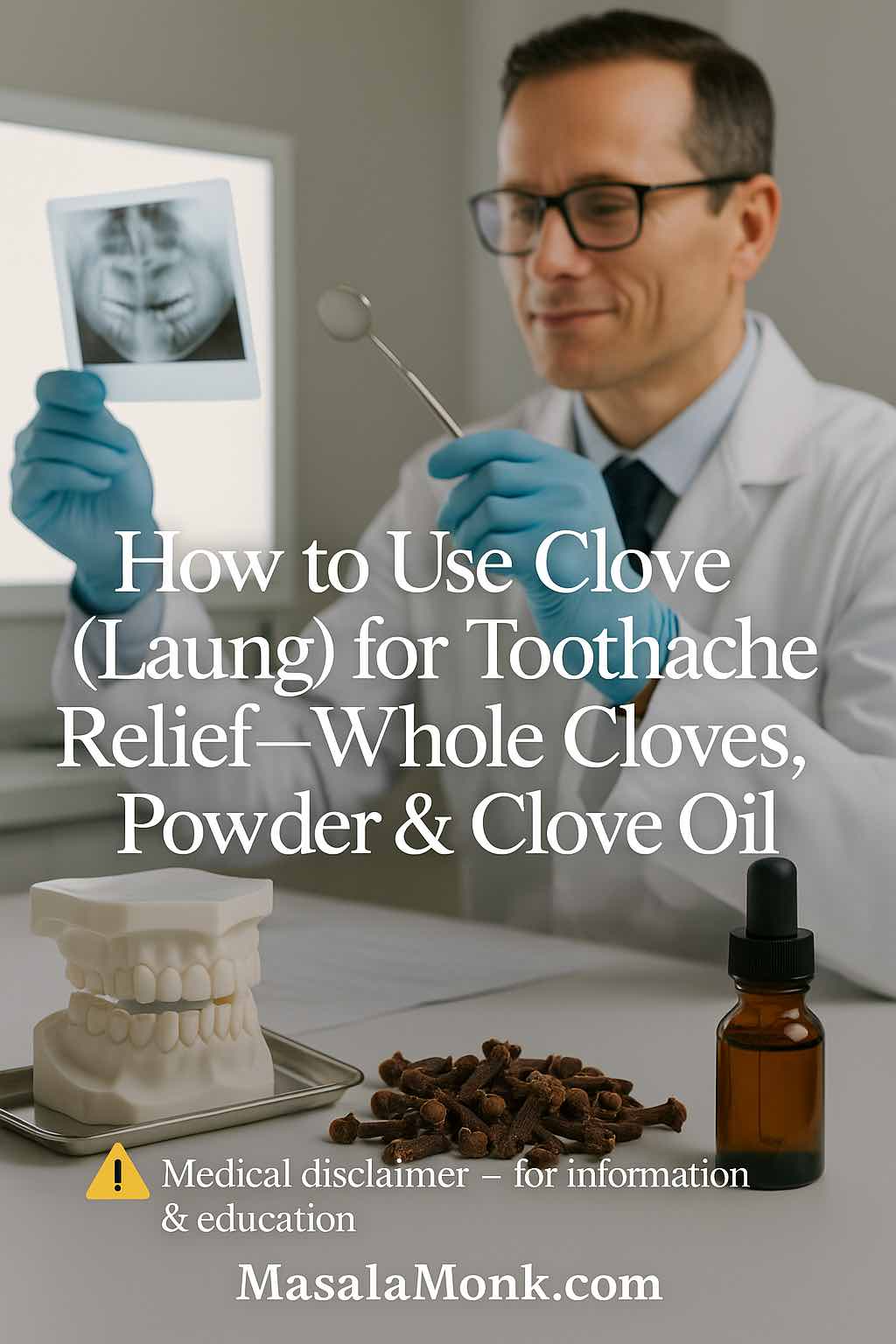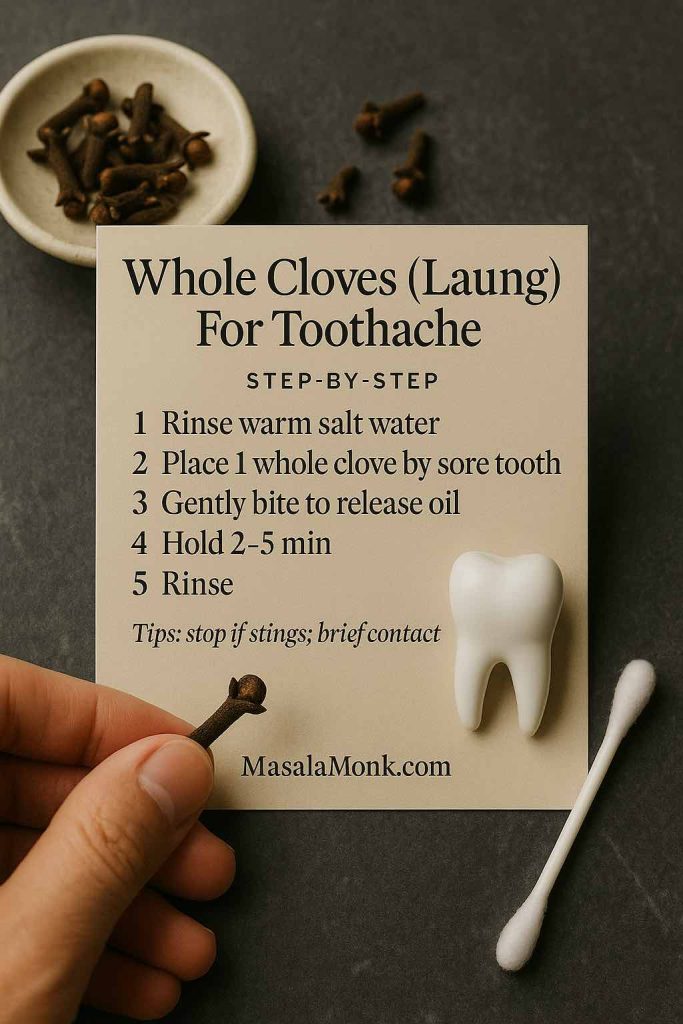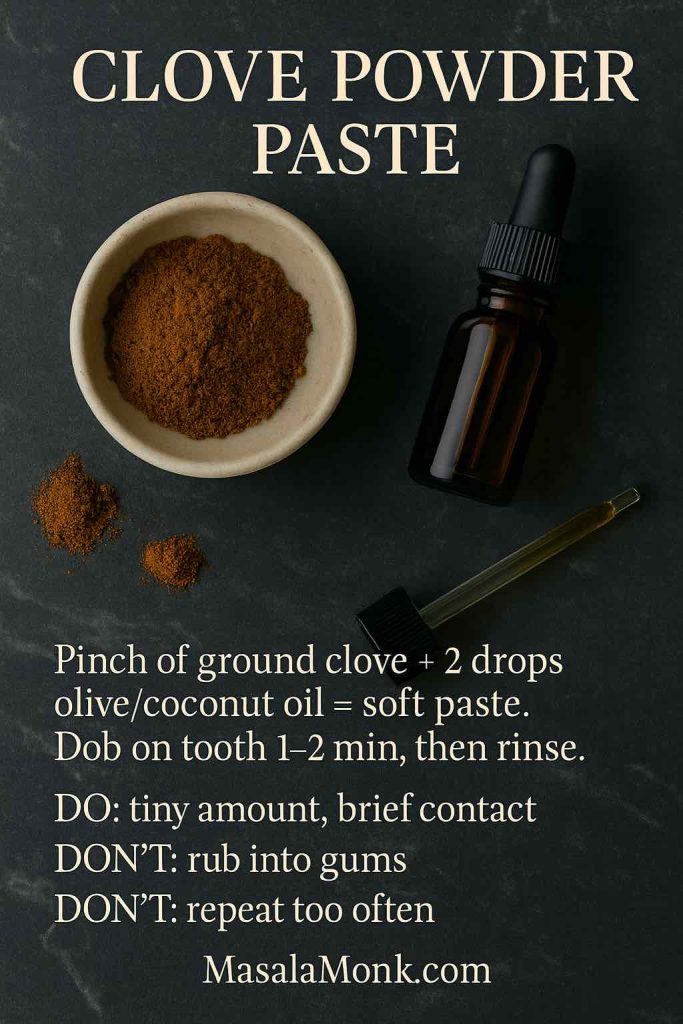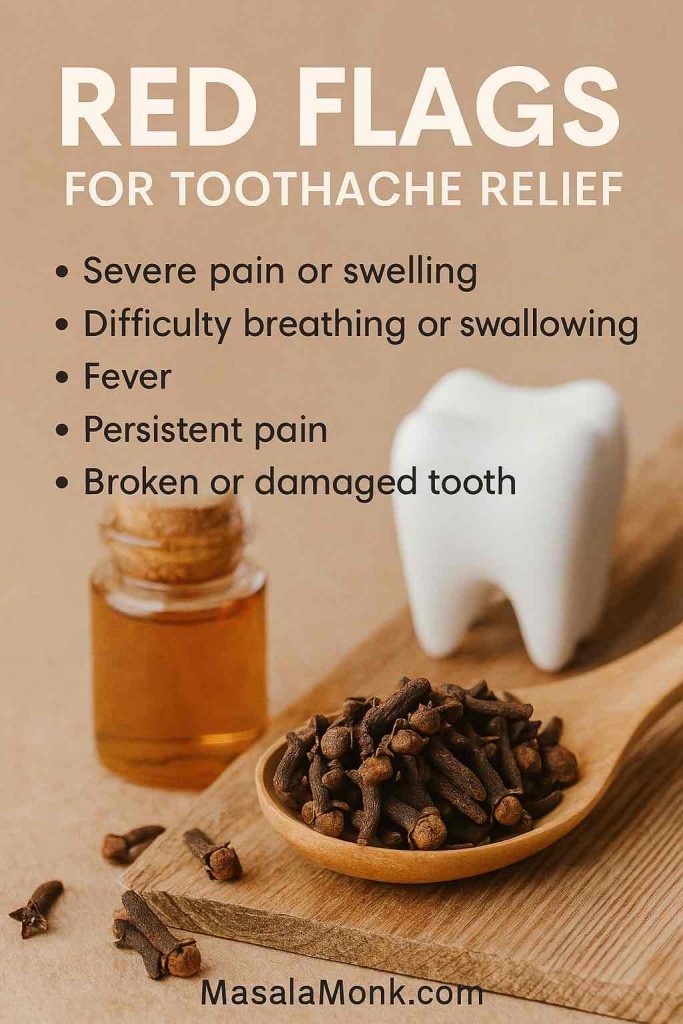
Toothache has a way of shrinking your day to one pulsing point. Food loses its charm, work blurs at the edges, and sleep becomes a negotiation. While you line up a dental appointment—and that part matters—there’s something small and practical in your kitchen that can help you cope: clove (laung). This is not a miracle cure. It’s a humane, careful way to turn down the volume on pain while you get real help.
Before we dive in, set your expectations. Clove can numb the spot it touches. It does not heal decay, reverse gum disease, or drain an abscess. If you’re dealing with swelling, fever, difficulty swallowing, or pain that keeps punching past 48 hours, it’s time to move from home strategies to professional care. Keep the NHS: toothache—what to do and when to see a dentist open in a tab. If you’re worried about an abscess, this page is blunt and useful: NHS: dental abscess—urgent treatment.
What follows is a practical, step-by-step way to use whole cloves, clove powder, and very dilute rinses for short-term comfort—backed by clear safety notes and on-point sources.
For a wider view of quick comforts while you wait for care, see our toothache remedies that help short-term.
⚠️ Medical disclaimer — for information & education
This post guides self-care; however, it does not diagnose or treat. Therefore, if you notice swelling, fever, difficulty swallowing/breathing, a foul taste, or pain lasting >48 hours, please seek urgent dental care. Additionally, do not ingest concentrated clove products; keep them away from children.
Clove for toothache: where it helps, where it doesn’t
Most toothache falls into a few patterns: an irritated nerve inside the tooth, inflamed gum tissue around it, a crack or cavity that reacts to temperature, or an infection building pressure. The reason clove for toothache makes sense is straightforward—local numbing. Think of clove as a volume knob, not a repair job. It buys you an hour to eat, a meeting without wincing, or a night’s sleep that doesn’t fall apart at 2 a.m.
And because this is short-term comfort, it belongs in a bigger plan for the next 24–48 hours:
- Soothe the area with whole cloves, a tiny clove-powder paste, or a very dilute rinse.
- Avoid triggers—scalding tea, ice water, hard chewing on the sore side, and sticky sweets that keep poking the nerve.
- Book a visit with your dentist, and escalate fast if red flags show up (the NHS guidance lays them out clearly).
If your pain keeps escalating, skim what severe toothaches usually mean and call your dentist.
Clove for toothache: how to use whole cloves (laung) safely
If you’re new to clove for toothache, start with whole cloves. They release their oil slowly, which makes them kinder to your gums than concentrated liquids—and for many people that’s enough to take the edge off.

A calm, step-by-step way to try it
- Rinse your mouth with warm salt water to settle the tissue and clear debris.
- Tuck one whole clove near the sore tooth.
- Let it soften; then gently bite to crack the surface and release a small amount of oil.
- Hold it there for a few minutes, then remove and rinse.
Between applications, many readers like a gentle routine such as oil pulling—here’s our guide to oil pulling for dental health.
This isn’t just folklore. A public-health self-care page explicitly mentions clove oil or chewing a whole clove for short-term relief: Healthify NZ: toothache self-care. A readable explainer that describes the “gently chew a whole clove and hold it by the tooth” method is here: MedicalNewsToday: clove for toothache.
Small guardrails that keep it comfortable
- If your gums sting or feel raw, stop. You’re soothing, not scrubbing.
- Don’t grind the bud into the gum line—your aim is to coax oil out, not sand the tissue.
- Don’t park a softened clove in your cheek for hours. Short contact, then a rinse, works best.
If chewing cloves works for you, here’s a closer look at the benefits of chewing cloves for oral health and all the ways cloves show up in daily life.
Clove for toothache relief: clove powder (ground cloves) with a tiny, gentle paste
No whole buds at home? Clove powder can help, but it’s stronger on delicate mouth tissue. The trick is to keep both dose and time small.

How to use clove powder for toothache without irritation
- In a spoon, mix a pinch of clove powder with a few drops of carrier oil (olive or coconut) or water to make a soft paste.
- With a cotton swab, touch the paste to the tooth area for 1–2 minutes.
- Rinse well, and give your mouth a break before considering another dab.
For a kitchen-table walkthrough of the paste method (pinch of powder + carrier, brief contact, rinse), this overview is useful: Healthline: clove oil/paste for toothache.
Why the carrier matters
Ground clove has a huge surface area. A drop of oil or water spreads contact, helps the paste stay put, and makes rinsing easier—less sting, same relief.
Ground rules
- Don’t leave the paste on for long stretches.
- Don’t rub it into the gum like a scrub.
- Don’t repeat every few minutes—short contact, then rest is the pattern that keeps your mouth calm.
⚠️ Medical disclaimer — for information & education
This post guides self-care; however, it does not diagnose or treat. Therefore, if you notice swelling, fever, difficulty swallowing/breathing, a foul taste, or pain lasting >48 hours, please seek urgent dental care. Additionally, do not ingest concentrated clove products; keep them away from children.
Clove for toothache rinse: clove water, tea, and a very gentle mouth swish
Warm clove tea sounds soothing—and it can be, as comfort. For acute toothache, though, plain clove water or tea hasn’t been shown to silence pain the way direct contact (whole clove or tiny paste) can. If you like the warmth of a rinse between direct applications, keep it very dilute:
- Add only a whisper of your already diluted clove preparation to a cup of warm water.
- Swish and spit—don’t swallow concentrated clove preparations.
- Treat it as a palate soother, not your main pain strategy.
If pain is spreading or new symptoms appear, circle back to the red flags in NHS: toothache and make the call.
Clove oil for toothache: safe dilution and a simple, sensible method
Even if you came for “clove for toothache,” most readers eventually ask about clove oil. Mouth tissue is delicate—so keep it conservative.

How to dilute clove oil for toothache (simple ratio)
- Mix 2–3 drops clove oil into 1 teaspoon (5 mL) of carrier oil (olive or coconut).
- Dip a cotton swab, dab the tooth area for a few minutes, then rinse.
- Avoid undiluted clove oil on gums or tongue—neat oil can burn.
What about those little brown bottles in pharmacies labeled “toothache liquid”? Those are eugenol toothache liquids meant for in-tooth cavity placement only—on a tiny cotton pellet, kept off soft tissues, and used sparingly. That’s not internet folklore; it’s right on the labels: DailyMed: eugenol toothache directions and an alternate DailyMed label with the same cautions.
These labels are also the best reason to avoid dabbing strong, undiluted clove oil directly on gums. They’re not designed for that; your mouth will tell you so quickly.
Does clove actually help dental pain? A quick look at what studies say
We’re not going to pretend there’s a mountain of randomized trials on kitchen clove use. Still, it’s useful to know that eugenol—the main active compound in clove—has been used in dentistry for its analgesic qualities. A clinical trial in the Dentistry Journal compared eugenol with articaine (a local anesthetic) for pain relief after a pulpotomy procedure; both groups improved, and the eugenol group showed a larger early drop in pain. It’s clinic context, not a DIY endorsement, but it does explain why clove feels like it “takes the edge off.” Read it here: Dentistry Journal randomized trial.
Safety first: dilute, keep exposure brief, and don’t swallow
Two safety points matter more than everything else:
- Undiluted clove oil is not gentle on soft tissue. In-vitro work shows clove oil can be highly cytotoxic to cells even at low concentrations—one more reason to dilute and keep contact short. If you like reading mechanisms and numbers, this paper is eye-opening: Cytotoxicity of clove oil on oral cells (PMC).
- Do not swallow concentrated clove products; keep them away from children. LiverTox (NIH) documents cases of acute liver injury after ingestion/overdose of clove oil: Eugenol (Clove Oil) — LiverTox. There’s also a clinical report noting that as little as ~10 mL of clove oil has been associated with hepatotoxicity and treated with N-acetylcysteine—useful context for why we keep doses tiny and topical: PubMed case series.
If any of that makes you hesitate, good—that’s your cue to stick with whole cloves or a tiny powder paste, or better yet, call your dentist sooner.
Clove for toothache vs infection: abscess, decay, and cavities
This is the line that keeps people safe: clove can numb pain; it does not treat infection, decay, or structural problems. If pain runs past 48 hours, if your face or gums swell, if you notice fever or a foul taste, it’s time to call a dentist. The NHS keeps it simple here: toothache—what to do and when to seek care. And if an abscess is on your mind, read NHS: dental abscess—clear, blunt, and very helpful.

A special case people ask about is dry socket—that deep, radiating ache a few days after a tooth extraction. This is clinic-only. Dentists often place zinc-oxide–eugenol dressings inside the socket to settle pain—very different from home clove use. Two concise resources if you want a clean explanation: StatPearls: alveolar osteitis management and a systematic review of dry socket dressings.
⚠️ Medical disclaimer — for information & education
This post guides self-care; however, it does not diagnose or treat. Therefore, if you notice swelling, fever, difficulty swallowing/breathing, a foul taste, or pain lasting >48 hours, please seek urgent dental care. Additionally, do not ingest concentrated clove products; keep them away from children.
Clove for toothache in daily life: meals, heat, and small habits that help
Clove does the numbing; your habits do the protecting. A few ordinary choices stretch relief further:
- Temperature sanity. Skip scalding tea and ice-cold drinks. Lukewarm is gentle.
- Chew on the other side. Give the sore tooth a holiday. Even soft foods can jab it if you chew right over it.
- Pause sugar and sticky sweets. They feed bacteria that make acids—bad news for an angry nerve.
- Rinse, don’t scrub. After using clove, rinse—don’t brush the tender area aggressively. Save the deep clean for tomorrow.
- Hydrate. A dry mouth makes every contact feel sharper.
Laung for toothache: a familiar remedy, used with modern care
If you grew up with laung as the first response to a sore tooth, you’re in a long tradition. The whole clove tucked by the tooth lines up with both tradition and common sense: slow release, local contact, brief exposure, and a rinse afterward. The modern tweaks are about safety: skip undiluted oils on soft tissue, keep contact short, and don’t delay real care if warning signs appear. For a plain, public-health note that specifically mentions chewing a whole clove, see Healthify NZ. For a clear, everyday explanation of the “hold a whole clove” method, see MedicalNewsToday.
Clove for toothache at night: a calmer routine that actually helps
Night magnifies everything. Here’s a rhythm that helps many readers make it to morning:
- One hour before bed: Eat something soft, neutral, and warm—not hot.
- Thirty minutes before lights-out: Rinse with warm salt water. Try one whole clove held gently by the tooth for a few minutes; rinse again.
- If you wake at 2 a.m.: Touch a tiny clove-powder paste for a minute, rinse, then sit upright and sip room-temperature water. Avoid chasing the pain with back-to-back applications—give the area time to settle.
If night pain intensifies or swelling appears, don’t increase clove—increase urgency and seek care (see NHS: toothache).
Clove for toothache products: oil, drops, and kits—what the labels actually say
A quick demystifier before a panic shop:
- Clove bud oil (essential oil) is concentrated—always dilute for oral use (e.g., 2–3 drops in 1 tsp carrier), dab briefly, then rinse.
- “Toothache liquid” / eugenol drops are designed for placement inside a tooth cavity on a tiny cotton pellet, kept off gums, and used no more than 4×/day. Read a real label before you try one—most people are surprised how strict they are: DailyMed label and alternate DailyMed label.
If managing these details sounds like more than you want to handle at home, that’s a good sign to call your dentist rather than escalate DIY strength.
What relief feels like—and for how long
Expect softening, not silence. With whole cloves, relief often creeps in over several minutes and buys you a small window—enough to eat, take a call, or rest your jaw. Talking about clove powder paste, the numb may arrive faster but risks irritation if you overdo it; keep the contact short. And coming to diluted clove oil, you’ll usually feel quick numbing; the key is brief contact, then a rinse.
If the ache spreads, intensifies, or picks up companions (swelling, fever, foul taste), the message is clear: self-care time is over. Re-check NHS: toothache and arrange urgent care.
A simple 24–48-hour plan (bringing it together)
Morning
- Soft, lukewarm breakfast.
- Whole clove held gently by the tooth for a few minutes; rinse.
- Book your dental appointment before the day runs away.
Afternoon
- If pain returns, try a tiny clove-powder paste for 1–2 minutes; rinse.
- Keep snacks plain and non-sticky; drink water.
- Chew on the other side.
Evening
- Warm salt-water rinse.
- If you like the comfort of warmth, a very dilute clove mouth swish (using your already diluted preparation) and spit.
- No undiluted oils; no marathon applications.
Any time
- If you see swelling or fever, or pain pushes past 48 hours, call a dentist. For suspected abscess, read NHS: dental abscess so you know what to expect.
The human bit
What makes toothache maddening isn’t only the pain—it’s the helplessness. Clove for toothache doesn’t cure the problem, but it hands you back a little control. You can soften a bud, touch a tiny paste where it hurts, and make gentle choices while you wait for real help. Use clove to win an hour of comfort and a calmer night. Use your phone to schedule the fix.
Keep exploring clove: Clove Oil for oral health: unlocking the benefits.
Curious about food-based smile care? How strawberries may brighten your smile naturally.
⚠️ Medical disclaimer — for information & education
This post guides self-care; however, it does not diagnose or treat. Therefore, if you notice swelling, fever, difficulty swallowing/breathing, a foul taste, or pain lasting >48 hours, please seek urgent dental care. Additionally, do not ingest concentrated clove products; keep them away from children.
FAQs
1) Clove for toothache: does it actually work?
Yes—because clove (laung) contains eugenol, which can gently numb the area it touches. However, it’s short-term relief. In other words, it helps you cope, but it doesn’t fix decay, infection, or cracks.
2) How to use whole cloves for toothache safely?
First, rinse with warm salt water. Then, place one whole clove near the sore tooth, gently bite to release a little oil, and hold it there a few minutes. Finally, remove and rinse. Start low and slow—if it stings, stop.
3) Whole cloves vs clove powder for tooth pain—what’s better?
Both can help. Even so, whole cloves are gentler and release oil slowly. Clove powder is stronger; use a tiny paste (pinch + a few drops of carrier oil or water) for 1–2 minutes, then rinse.
4) Clove powder for toothache: how do I make the paste?
Simply mix a pinch of ground cloves with a few drops of olive or coconut oil (or water) to form a soft paste. Next, dab on the tooth area briefly, and, importantly, rinse well.
5) Clove oil for toothache: what dilution should I use?
As a rule of thumb, mix 2–3 drops clove oil into 1 teaspoon (5 mL) of carrier oil. Then dab with cotton on the tooth area for a few minutes and rinse. Avoid undiluted clove oil on gums or tongue.
6) How often can I use clove for toothache in a day?
Use brief, spaced applications—for example, a few times across the day. That said, if you need constant re-application, the pain likely needs dental attention rather than more clove.
7) Clove water or clove tea for toothache—does it help?
It can feel comforting and warm, but relief is usually milder than direct contact. Therefore, think of clove water as a gentle rinse between methods, not your main pain strategy.
8) Can clove for toothache help a tooth infection or abscess?
Not really. Clove can mask pain, yet it cannot clear infection. If you notice swelling, fever, a bad taste, or pain that lasts beyond 48 hours, you need a dentist—not more clove.
9) Is clove good for cavities or tooth decay?
Clove can numb discomfort from a cavity, but it does not heal decay. The real fix is dental treatment; clove is just a stop-gap so you can function until you’re seen.
10) Clove for gum pain—can I use it on the gums?
Yes, but carefully. Use diluted clove oil or a tiny powder paste for very short contact, then rinse. If gums are inflamed or bleeding, treat clove as a brief comfort, not a cure.
11) Clove mouth rinse for tooth pain—how do I do it?
Make a very dilute rinse by adding just a whisper of your already diluted clove preparation to warm water. Swish, spit, and then rest. Again, keep it gentle and avoid swallowing.
12) Laung for toothache—any special tips?
Yes: keep it minimal and mindful. One whole clove at a time, gentle pressure, short hold, thorough rinse. Moreover, avoid grinding the clove into your gum line.
13) How long does clove toothache relief last?
It varies—often minutes to a short while. Consequently, use it to eat, to rest, or to sleep—not to delay a needed appointment.
14) Can I sleep after using clove for toothache?
Ideally, yes. About 30 minutes before bed, try a whole clove hold, rinse, and then keep drinks lukewarm. If you wake up sore, a tiny paste for a minute and a rinse can help you drift back.
15) Is clove safe for kids, pregnancy, or sensitive mouths?
Be extra cautious. Choose the gentlest forms (whole clove or very dilute, very brief contact). If in doubt—or if pain persists—seek professional guidance.
16) Can clove whiten teeth or freshen breath?
Clove has a spicy, warming aroma that may feel fresher, yet it isn’t a whitening treatment. Therefore, don’t expect color change; use it for comfort only.
17) What if clove burns or irritates my mouth?
Stop immediately. Rinse with water, switch to milder methods (e.g., whole clove), and shorten contact time. Your mouth should feel calmer within minutes, not worse.
18) What should I avoid while using clove for toothache?
For starters, avoid undiluted clove oil, long contact times, and very hot or icy drinks. Also, skip sticky sweets and hard chewing on the sore side—they keep re-triggering the nerve.
19) When should I stop home care and see a dentist?
If pain lasts more than 48 hours, or you notice swelling, fever, or difficulty swallowing, it’s time to escalate. Relief is helpful; treatment is essential.
20) Quick plan: how do I use clove for toothache across a day?
Morning: whole clove hold, then rinse.
Afternoon: tiny clove-powder paste for 1–2 minutes, then rinse.
Evening: very dilute rinse, spit, and sleep routine.
Anytime red flags appear: call your dentist.













